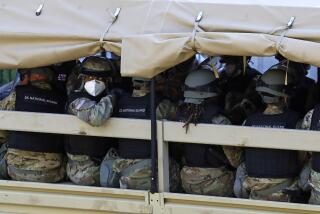Clinton Rejects Using Guard in Capital, Aides Say
- Share via
WASHINGTON — President Clinton on Monday rejected Washington’s request for National Guard troops to fight crime in the city, White House aides said, and he urged the city to look to Congress instead for authorization.
Washington Mayor Sharon Pratt Kelly, in a stunning acknowledgment that crime is out of control on many of the capital’s streets, asked Clinton last week to give her the authority to use 125 guardsmen to help the city battle crime. But Clinton said that he does not believe he has legal authority to grant such power to Kelly, aides said. He pledged to support her efforts to win congressional approval for the proposal.
“While I cannot agree to every aspect of your request, I will take certain actions to help grapple with the district’s crime problems,” Clinton said in two-page letter to Kelly.
The promised steps: Get his anti-crime bill passed, help the district expand its current use of Guard troops, and support legislation in Congress that would give Kelly governor-like power to call out the Guard.
Rep. Julian C. Dixon (D-Los Angeles), chairman of the District of Columbia subcommittee of the Appropriations Committee, said that Clinton’s move apparently will delay any relief for Kelly until at least next year, when Congress may get around to considering the issue.
“The President’s turndown does not give her any immediate relief for her immediate crisis,” Dixon said.
The mayor’s request put Clinton in something of a political bind. He has spoken often recently about the anguish of Washington residents because of crime and said last week that he was sympathetic to her plea.
Sources familiar with Kelly’s request said that the issue became tied up in the complex and racially charged politics of Washington’s drive for statehood, which Clinton has supported. State governors have the power to call out the National Guard, but the District of Columbia is a jurisdiction under direct federal supervision.
Clinton has the authority to call out the troops for duty in Washington. But Kelly wanted Clinton instead to delegate the authority to her--a step that would give her the power of a governor. One source said that the mayor apparently viewed the issue as one of “equal dignity.”
Justice Department officials reviewed the issue and in a memo told Clinton that he had three options: call Guard troops into federal service, deploy the Guard as a state militia and command them himself or support congressional authorization to delegate command powers to Kelly.
Kelly may encounter stiff resistance in Congress to a proposal giving her such power. Republicans in particular have fiercely opposed the idea of giving the district the prerogatives of a state.
Kelly had not sought use of the troops to directly fight crime. Instead, she wanted to use them for administrative and clerical duties, thereby freeing Washington police officers for patrol and investigative duties.
As an alternative, Dixon said that Kelly could turn to federal agencies that provide services to Washington in hopes of obtaining clerical and administrative help. He said that she also could try to increase the police budget for overtime, though the city is facing a severe budget crisis.
Kelly, Atty. Gen. Janet Reno and Lee P. Brown, director of the White House Office of Drug Control Policy, are expected to discuss the matter at a meeting today.
The mayor’s request focused international attention on the crime problem in Washington, which has suffered a surge of drug-related violence. The city has seen 378 killings so far this year. At the current rate, the year-end total will outstrip the 451 deaths recorded last year.
Under a federal law passed by Congress to deal with drug crimes, there are 50 Guard troops currently assisting the district with police operations. Their duties have included aerial surveillance and nightly missions in which high-intensity lights are used to illuminate crime-ridden areas.
The Washington Post reported over the weekend that the overworked Washington law enforcement system wins convictions in only about one of four murder cases, compared to conviction rates of four in five cases in many other large cities.
More to Read
Get the L.A. Times Politics newsletter
Deeply reported insights into legislation, politics and policy from Sacramento, Washington and beyond. In your inbox twice per week.
You may occasionally receive promotional content from the Los Angeles Times.











